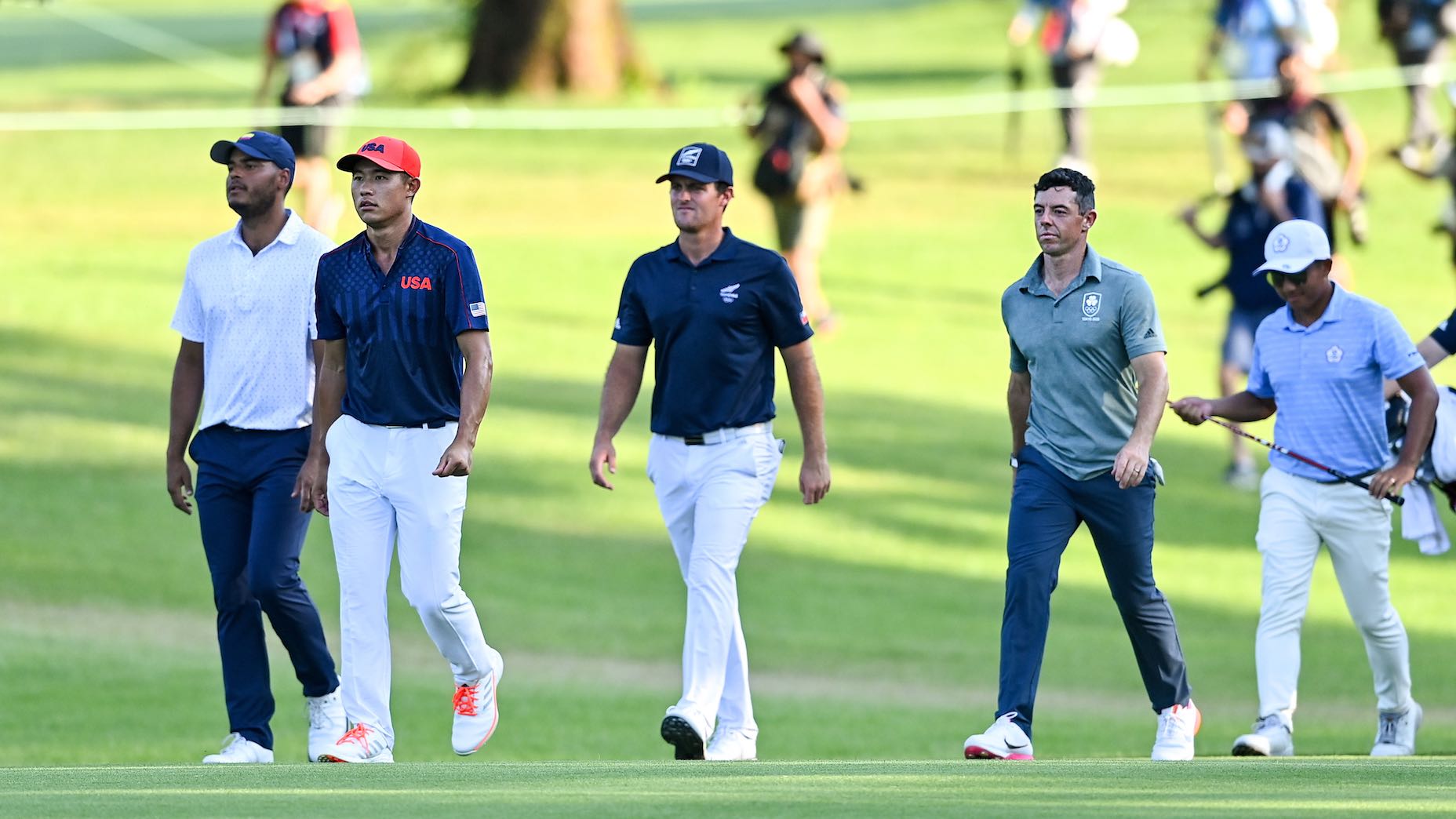What’s that? You don’t think golf should be in the Olympics?
Too boring, you say. Not enough drama.
Was the perennial runner-up escaping trees, rough and demons for a miraculous 18th-hole par to win a life-changing gold medal not enough for you?
How about the South African-turned-Slovakian shooting a preposterous final-round 61 and fist-pumping his birdie putt on 18 when it was only about halfway to the hole to claim silver? Was that not weird enough?
Well then, let me take you to the scene at No. 18 tee at about 3:25 a.m. Eastern Standard Time (4:25 p.m. local time), when seven of the world’s best golfers headed back to the course to play for the illustrious honor of solo third place.
As it turns out, once people stop handing out something insignificant like “a million dollars” for third place (the prize for second runner-up at this year’s Players Championship) and instead play for a small copper circle (yeah, they make the bronze medals from mostly copper), things get awfully interesting. At least, interesting for those still awake to watch. The Olympics was marketed as a chance to “grow the game,” but the late hour likely thinned the herd of viewers to golf sickos and insomniacs.
In wonderfully Olympic fashion, the seven pros in the bronze-medal bonanza represented seven different nationalities. One guy (Collin Morikawa) had just won his second major championship in less than a year. Another guy (Rory McIlroy) was the proud owner of twice that many. A third (Mito Pereira) was playing on the Korn Ferry Tour a few weeks ago. And that was less than half the playoff’s competitors.
The Olympic playoff rules dictate that as long as no more than six players are in a playoff, they can all go off in the same group. Well, bad news for the Olympic playoff rules. Seven golfers — in just a 60-player field! — meant a foursome and a threesome navigating an awkward two-step down the challenging 18th.
C.T. Pan was first to scare the hole for a potential walk-off birdie. Pan, representing Chinese Taipei, had been left for dead after a first-round 74 but then played the next 54 holes better than anyone else in the field, shooting 66-66-63 to join the party at 15 under. On the first playoff hole, his putt grazed the very left edge. Nobody else got closer.
Two players were unable to attend the par-fest on the first playoff hole. Paul Casey drove it into the trees, punched out and couldn’t get up-and-down. Hideki Matsuyama, who missed a short par putt at No. 16 and a short birdie putt at No. 17, watched another try go wanting as scores of Japanese media winced from the sidelines.
The rest of the fellas played on. There was Rory McIlroy, who’d been hat-free all week and whose shirt was now untucked, too, contributing to the general vibe of, “We’re still doing this, huh?” He escaped the first playoff hole with a nifty up-and-down from 50 yards. Across the PGA and European tours, McIlroy has logged exactly one third-place finish in each of the last four years. None of them required extra golf.
Mito Pereira had the best look at birdie at the second playoff hole, the par-3 10th, but he borrowed an extra half-cup of break. Finishing just shy of the bronze would hardly be a failure for the young Chilean, who only earned his PGA Tour status a few weeks ago. But he’s gotten used to winning — three times on the Korn Ferry Tour since the start of 2020, to be exact.
Just as the playoff seemed to be stalling, Collin Morikawa re-introduced himself. His short iron at No. 11 grazed the flag, landed less than a foot from the cup and skittered to a stop like a crisply-struck cue ball.
Morikawa’s birdie felt like a walk-off, but it was anything but. Pereira’s birdie try horseshoed back towards him. McIlroy’s short attempt lipped out, too, perhaps thanks to a stray bounce off Morikawa’s ball mark. Sebastian Munoz settled for par, too. That left only Pan, who hit it nearly as close as Morikawa and whose three-footer found the center of the bottom of the cup.
Pan and Morikawa exchanged well wishes with the eliminated players and caddies and plowed on to No. 18 again. Pan drove it in the rough; Morikawa found the fairway. The advantage swung to the world’s greatest irons sniper. But Morikawa made an uncharacteristic error of distance control and found the face of the front bunker, where it plugged. Bogeys seemed likely. The playoff was starting to seem slightly less fun. Surely two players sharing bronze wouldn’t be the worst thing?
But there’s one thing that’s true about all playoffs: They end abruptly. Morikawa’s par putt slid by. Pan’s found the center of the hole. The bronze medal was his.
The seven-car pileup was suddenly cleared. Pan rolled on to the podium. On the East Coast, it was nearing 5 a.m. At Pan’s home in Bellevue, Wash., it was nearly 2. The fact that anyone was still watching was a testament to the power of a bronze medal.
Golf in the Olympics has some juice after all.
